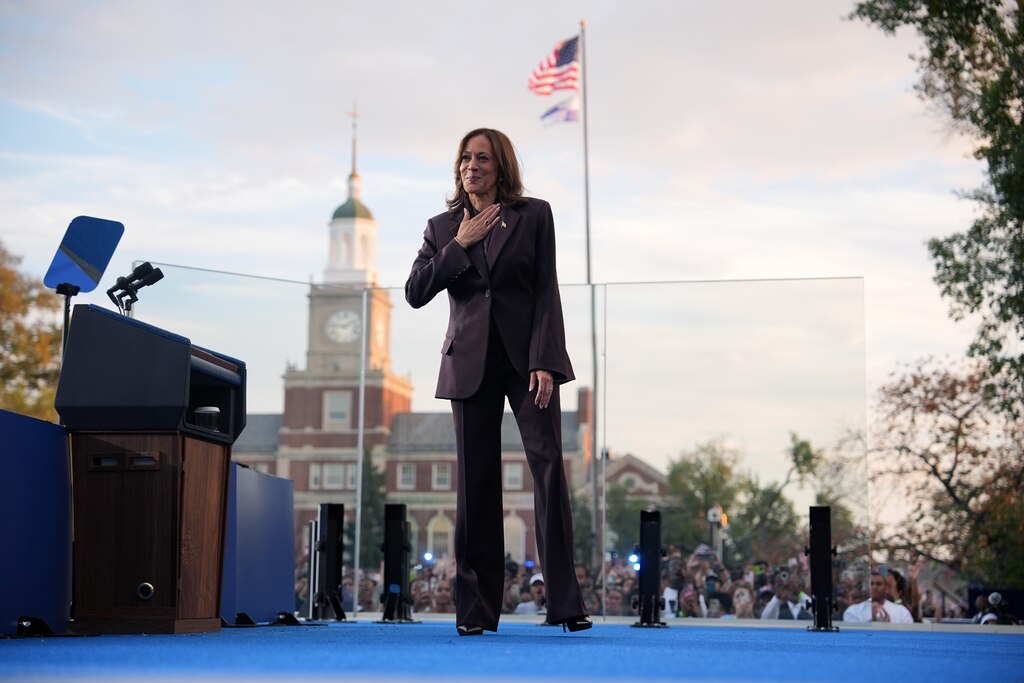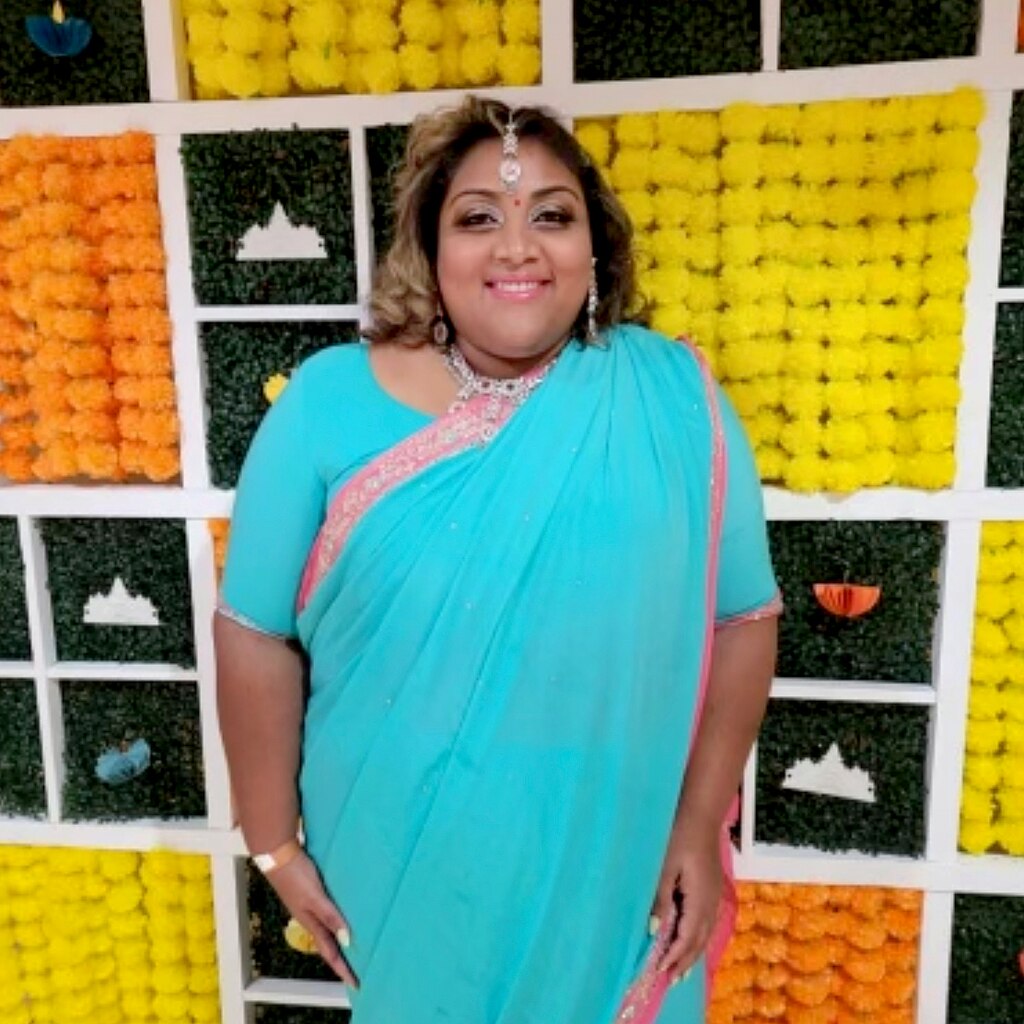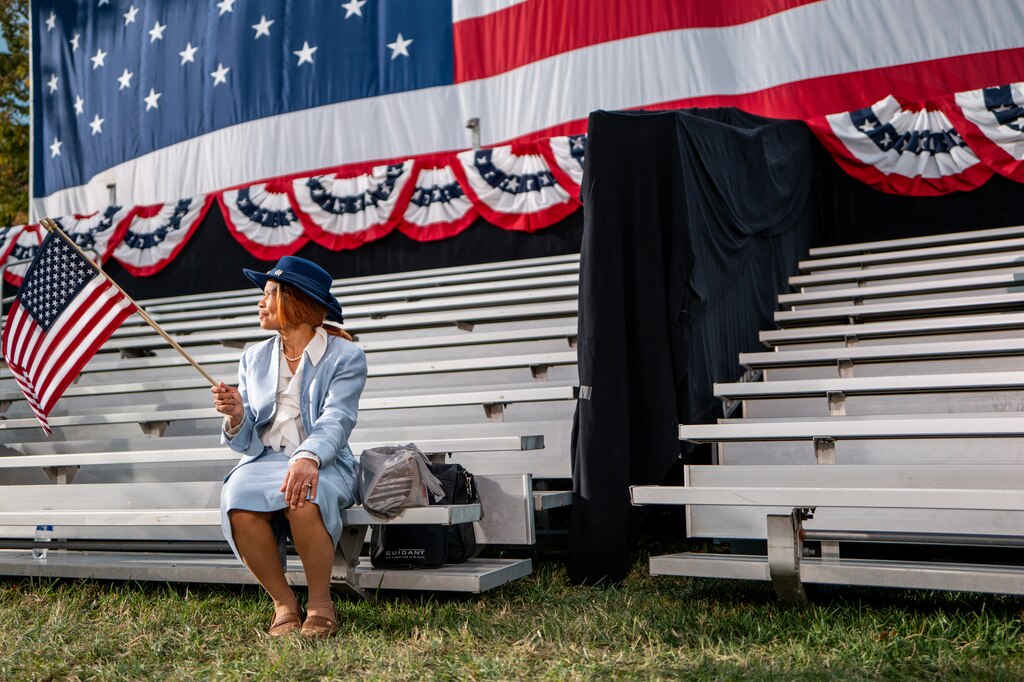Bernadette Woodbury, 70, vividly remembers her parents taking her and her three brothers to the voting booth in Atlanta shortly after the Voting Rights Act passed.
“I have lived through the Civil Rights Movement. My parents lived through Jim Crow. I’d be a disgrace if I didn’t vote,” Woodbury said. “A failure to vote is on me. I have a vote. I have a say as to if or we do not have a democracy.”
Bonnie Hadley, 69, called Tuesday’s election the most important of her lifetime.
“It’s amazing. It’s well overdue,” she said about the possibility of having the first woman become president of the United States, especially one of Black and Asian descent. “We should have had Hillary eight years ago. But it was divine intervention that Joe gave it up. It was so important to me to crack that glass ceiling.”
The Baltimore Banner thanks its sponsors. Become one.
But as the votes rolled in, and the dust settled, so did the reality that Kamala Harris, the Democratic candidate, would not make history.

Hadley’s initial elation to Alsobrooks’ election as the next U.S. senator for Maryland, the first Black woman to represent the state there, turned to despair as Harris’ loss became evident.
“I’m devastated about the outcome of the presidential race,” the Greenbelt woman said.
“Racism in America rules,” said Woodbury, a Mitchellville retiree. “I am deeply saddened for my grandchildren.”
Despite Harris’ loss, history was made — just not fully realized, said Charisse Paige, 46, who lives in Baltimore’s Ashburton neighborhood.
The Baltimore Banner thanks its sponsors. Become one.
“I was able to support a Presidential candidate that looked like me,” she said. “While the outcome was not what I wanted, the historical significance is not lost on me.”
For many Black women, the Democratic Party’s most loyal voting bloc, the sting of Harris’ loss feels like a vote against them.
“As a Black woman, I cannot help but internalize this loss. It’s one I know all too well, as do my mother and daughters, but I remain hopeful,” Paige said. “It’s a hope rooted in the strength, confidence and audacity to dream that Kamala possesses, as do I.”
Although Paige described Harris’ loss as one for all women, she said Black women were particularly aggrieved.
“We are accustomed to having to show up overqualified only to be underestimated and ultimately silenced,” she said. “We are the backbone of not just our households, but society, yet we still fight tooth and nail for the respect and understanding our white counterparts are given without question or hesitancy.”
The Baltimore Banner thanks its sponsors. Become one.
A speech by Baltimore Mayor Brandon Scott defending Black women in the light of Harris’ loss has gone viral with more than 587K views on Instagram.
“It is really on my heart this morning to say that as a man, but more importantly as a Black man, that this country does not deserve Black women or Black people, but specifically Black women,” Scott said.
“I’m thinking about the world that we’re going to bring our daughter into in a few months,” Scott said. “And I want the vice president to know that her and her team did everything right in the right way. But the unfortunate reality is that this country is still steeped in racism, sexism and misogyny.”
Scott also praised Harris and the campaign she ran.
Yojinde Paxton, 43, a political consultant who lives in Baltimore’s Barclay neighborhood, was upset by the “clear message” Harris’ loss sent.
The Baltimore Banner thanks its sponsors. Become one.
“No matter how much support, canvassing and news coverage the Harris campaign received, the result was a loss,” said Paxton, adding that her loss reaffirmed that Black women have to be 10 times better than any man.
“Even though women always come to save men, they are still not supportive of us,” she said. “I internalize this because no matter how qualified we are, it’s never enough. We get paid less than our white male counterparts. It’s very misogynistic.”
Tracey Beale, 49, said Harris’ loss was more than a rejection of Black women.
“The rejection, control and the overall idea of putting Black women in their place, is not new, nor is it the sole reason for this outcome,” the jewelry designer and metalsmith from Pikesville said. “I see Harris’ loss and Trump’s win as a reflection of the society and culture we live in ― as unnerving as this may be.”
Beale said she was not going to internalize the loss and instead lean into her work as an artist and cultural curator to support new ways of thinking, creating and learning.
The Baltimore Banner thanks its sponsors. Become one.
Many of the people interviewed for this story said Harris’ loss conjured feelings similar to 2016 when Hillary Clinton lost.
“It stung even more this time around with Harris,” Paxton said. “As a Black woman casting my vote for another Black woman, I am at a loss for words. HERstory was being written. This was not the ending I anticipated.”
Mack Garvin, 41, who lives in Baltimore’s Highlandtown, said she voted for Harris because “she was the, in my mind, the most qualified candidate with her experience and character. On top of that, her representation would be so powerful for women and girls and people of color.”
Garvin said Trump’s victory “feels like a win for the patriarchy, benevolent sexism and the social hierarchy that upholds systems that limit opportunities outside the dominant group,” she said. “I think her loss highlights the intersectional dynamics Black women face daily.”
Some proud Harris supporters were disappointed but not surprised by the outcome.
The Baltimore Banner thanks its sponsors. Become one.
“I don’t internalize it because as a Black woman, I’ve read this script before,” said Terri Lee Freeman, president of the Reginald F. Lewis Museum of Maryland African American History & Culture, who voted for Harris. “America has spoken loud and clear. For me ... I am not at all surprised.”
Tia Hopkins said she was shocked by Trump’s victory — adding that she expected an outcome similar to the hotly contested, disputed 2020 election where Joe Biden beat Trump.
“I expected a decision in a few days. I just knew Pennsylvania was going blue,” said Hopkins, who along with Antonio Bowens became the state’s first openly nonbinary candidates elected to the state Democratic Central Committee in 2022. “They’ve elected Democrats for governor in three consecutive elections. Biden won it in 2020. I was shocked to hear that around 25% of Black men in Pennsylvania voted for Trump. He only got 10% of Black men in 2020 in Pennsylvania.”
Hopkins believes a minority of Black men reject Black women as leaders.
“However, I would argue that what happened [Tuesday] was a sign of deep moral issues in our country,” Hopkins said. “People have sold out diverse groups of Americans on the promise of more money for themselves.”
Wanika Fisher, a Prince George’s County Council member of Black and Indian descent, thinks that Harris’ loss is “multifaceted” with more than race and gender at play.

Fisher attributed Harris’ loss to the absence of a regular primary process; the lack of better differentiation between Harris and Biden; and the Democratic party’s tepid appeal to men, including those of color.
“It’s much easier to build on fear and misinformation,” Fisher said. “It’s a much harder task to build a coalition on real results and policy change.”
“Kamala Harris was historic and still remains historic,” she said. “I was hoping that voting for her would led to her being president of the United States. But maybe there will be another chapter.”
Nykidra “Nyki” Robinson, founder of Black Girls Vote, a nonpartisan national group, said it’s easy to “play Monday morning football,” but Trump’s win “should be a wake-up call to many people who oftentimes think that we have allies in certain spaces.”
Robinson mentioned that two months ago she said she was not expecting to see an uptick in support of Harris from white women — despite issues like reproductive rights being hot topics. She also cited the numbers of Latines voting for Trump.
“Ultimately, I don’t think that white women wanted to give up their convenience, their comfort, and go against their husbands. So, what we saw was that [a majority] voted for Donald Trump,” she said. “When you go to the voting booth, it’s between you and your ballot. And no one knows how you will vote. We see what happened and numbers don’t lie.”

Robinson echoed the impact of seeing a Black woman at the top of the ticket.
“It meant a lot for a lot of people — for us as an organization, Black Girls Vote. I didn’t anticipate seeing it in my lifetime, but we are here,” she said. “But America has spoken and said, ‘We choose Donald J. Trump.’ All we can do is adjust and make sure that no matter who is important, they understand the importance of the Black vote.”



Comments
Welcome to The Banner's subscriber-only commenting community. Please review our community guidelines.